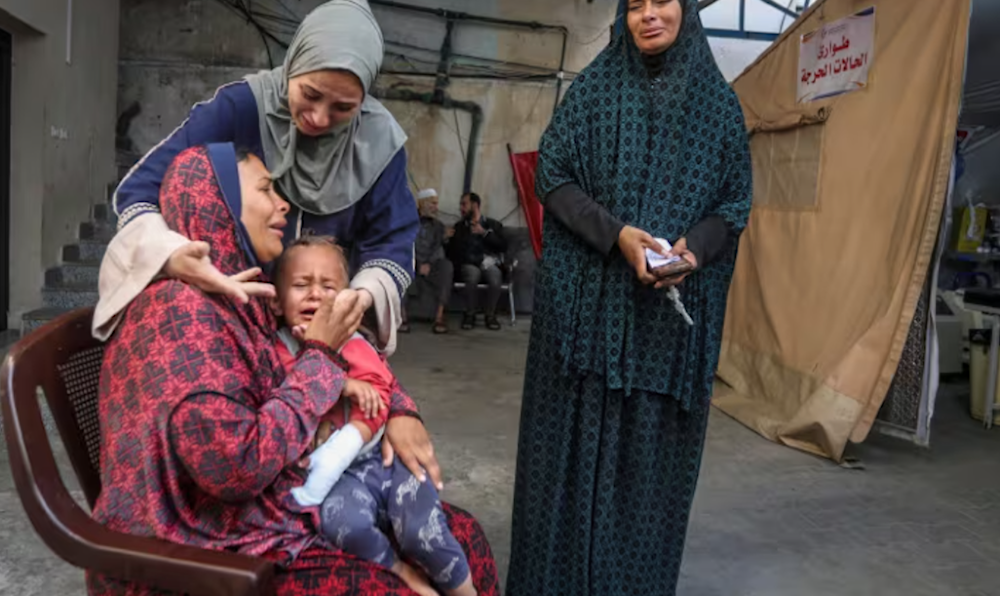Unexploded munitions; lingering threat to Palestinians even post-war
According to the United Nations, an estimated 7,500 metric tons of live ammunition might be spread across the Gaza Strip.
-

Palestinians mourn their relatives killed in the Israeli bombardment of the Gaza Strip at a hospital in Rafah, Gaza, on May 10, 2024. (AP)
As the Abu Samur family and Palestinians return to regions of Gaza destroyed by months of fighting, international organizations and charity groups warn of a hidden threat: unexploded munitions.
According to NPR, in southern Gaza, after the Israeli occupation forces (IOF) withdrew last month, a 14-year-old was injured when he laid hands on an explosive device he believed was a perfume or deodorant bottle.
Mohammed Abu Samur had returned to his home with his family and observed that only their bathroom remained from their entire home.
Mohammed lost most of his fingers on his right hand and fully lost his left hand, with physicians taking 7 hours of surgery to save his legs.
However, they warned he may still lose them to illness in Gaza's devastated health system.
When NPR reached Mohammed's hospital bedside in early May, his wounds had not been cleaned in many days. Flies buzzed around his shrapnel-pocked face, and his bandages had become yellow and green.
According to weapons specialists, the canister Mohammed found was most likely the fuse for an anti-tank mine, potentially a US-made variant, used by the occupation to allegedly destroy Hamas tunnels.
As starvation sweeps across Gaza, some of these fuses have been mistaken for canned food.
Explosives scientists estimate that 10% of bombs do not ignite on impact. According to the United Nations, an estimated 7,500 metric tons of live ammunition might be spread across the Gaza Strip.
Mungo Birch, head of the UN Mine Action Service (UNMAS) in the Palestinian territories, stated, "It's everything from mortars, artillery shells and grenades to improvised rockets and bombs and missiles," adding that when families return to their dwellings, it is "one of the most dangerous times."
When the events in Gaza unfolded on October 7, Birch was already in Gaza attempting to clean explosive munitions from the Seif Al-Quds Battle in 2021.
More rubble in Gaza than in Ukraine
He argued that much of the unexploded munitions is concealed among 37 million metric tons of debris, according to the United Nations.
"There's now more rubble in Gaza than there is in Ukraine," Birch stated, citing that although the front line in Ukraine is 600 miles long, Gaza's is only 25.
When a United Nations team visited Khan Younis, where the Abu Samur family resides, they discovered 1,000-pound unexploded bombs on major intersections and inside schools.
Erik Tollefsen, an explosives expert who served in the Norwegian military and is now with the International Committee of the Red Cross (ICRC), revealed that of all the locations he has seen, "nothing compares" to Gaza, detailing unexploded artillery rounds within feet of the ICRC headquarters and children playing around unexploded rockets in refugee camps.
Usually, explosives require a controlled detonation, something impossible to acquire due to Israeli bans on certain products brought in by aid organizations.
Tollefsen carries his own climbing equipment and fishing hooks, using them to carefully move explosives away from people's tents. However, without heavy equipment, he cannot dispose of the explosives.
Aid workers are mapping the locations of deadly weapons and issuing warnings on social media. However, with energy scarcity and 4G access limited in Gaza, they are also putting up stickers and distributing pamphlets, especially since children are extremely vulnerable due to their curiosity.
While an anonymous Israeli spokesperson told NPR that the IOF do carry ammunition off the battlefield with them when they leave "where it is feasible," experts argue that much needs to be done and that many more curious young people, like Mohammed, would bear the brunt of the fight.
Blinken defends decision to pause 3,500 bombs delivery to 'Israel'
US Secretary of State Antony Blinken explained on ABC News' This Week that the US has temporarily halted a shipment of 3,500 bombs, made up of 2,000-pound and 500-pound bombs, to "Israel", allegedly for concerns that they would potentially be used in Rafah, where approximately 1.4 million Palestinians were forcefully displaced to under the pretext of a "safe zone".
Blinken claimed that this suspension is specific to this shipment and is based on the absence of a credible Israeli plan to protect Palestinians in Rafah. He also reiterated US President Joe Biden’s commitment to supporting "Israel's" right to "defend itself", noting that further restrictions on arms deliveries might be considered if "Israel" proceeds with a full-scale invasion of Rafah.
Earlier, according to Blinken, Biden had made a clear statement addressing Tel Aviv, alleging that if Israeli occupation forces launch this major military operation on Rafah, "then there are certain systems that we're not going to be supporting and supplying for that operation," adding, "We have real concerns about the way they're used."
Biden further told Tel Aviv, as cited by Blinken, that "Israel" needs to "have a clear, credible plan to protect civilians, which we haven't seen."
This comes after Biden, on Wednesday, May 9, admitted that the Israeli occupation has killed civilians in Gaza using bombs supplied by the United States, marking the first instance of such an admission by any US official since the genocidal war on the Strip began last October.
His remarks came during an interview for CNN, where he also commented on the recent Israeli invasion of Rafah.

 5 Min Read
5 Min Read








